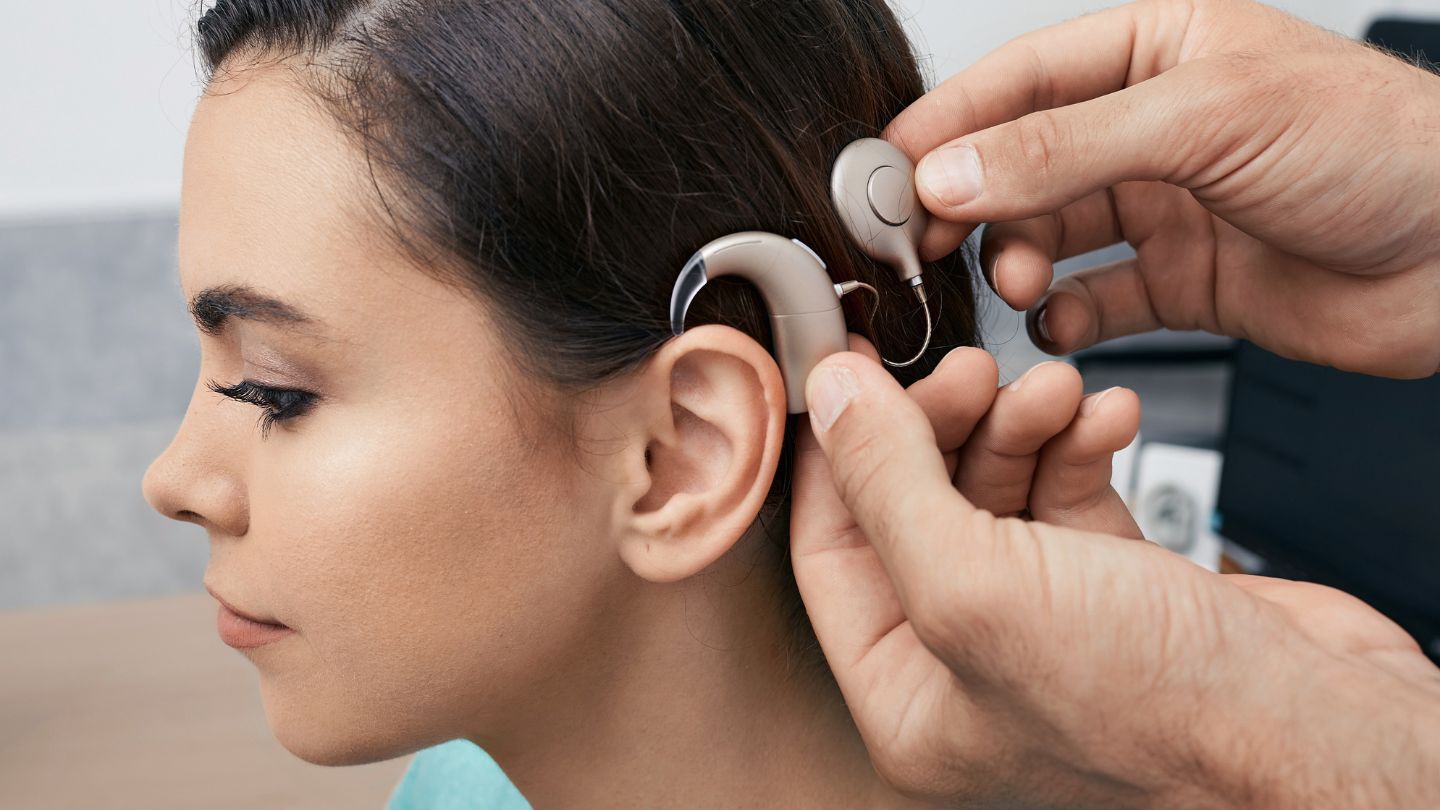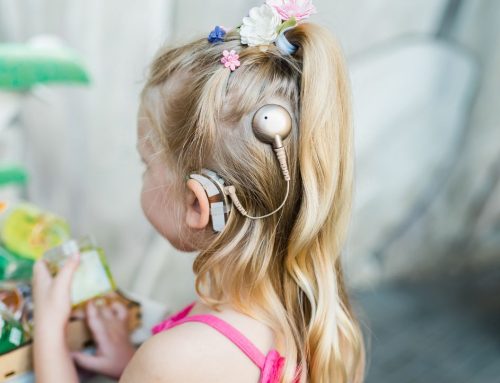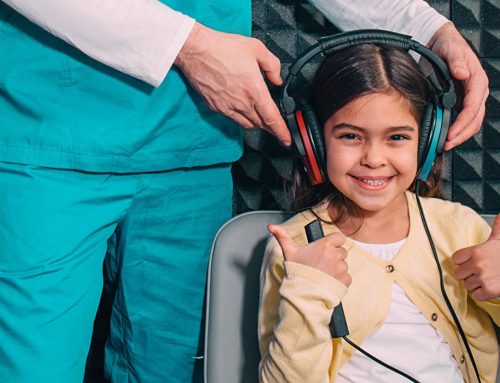Cochlear implants bring life-changing benefits for children with severe to profound hearing loss. These advanced assistive devices not only enhance hearing but also support the development of spoken language and social skills, opening doors to a richer world of communication and learning. In this blog, we will explore what cochlear implants are and the benefits of cochlear implant in kids.
Key Takeaways
- Cochlear implants provide essential hearing improvement for children with profound sensorineural hearing loss, helping them develop spoken language and communication skills.
- Early implantation significantly improves hearing and language skills, especially for children with severe hearing impairment.
- Cochlear implantation in children has lasting benefits, improving their social interactions, educational experiences, and overall quality of life.
Understanding Cochlear Implants and How They Work
Cochlear implants are advanced electronic devices designed to provide auditory awareness for individuals with severe to profound hearing loss. Unlike traditional hearing aids, which simply amplify sound, cochlear implants stimulate the hearing nerve directly by bypassing damaged inner ear hair cells. This unique capability allows children with cochlear implants to experience a range of sounds, from subtle environmental cues to spoken words, helping them understand speech more effectively.
Who Can Benefit from Cochlear Implants?
Children who experience profound sensorineural hearing loss in both ears often benefit from cochlear implants. Candidates typically range from 12 months to 17 years old, although in certain cases, infants as young as six months may be considered. Cochlear implantation helps children with severe hearing loss who may find limited benefit in wearing hearing aids alone, enhancing their ability to hear, communicate, and connect with others. At Pediatric Ear Nose and Throat of Atlanta, P.C., we provide personalized evaluations and guidance for families exploring cochlear implant options for their children.
The Cochlear Implant Procedure and Recovery
The cochlear implant procedure is a surgical process performed under general anesthesia. During surgery, a small incision is made behind the ear, and electrodes are inserted into the inner ear. Once the implant is activated, it sends sound signals directly to the auditory nerve, allowing the child to perceive sounds and speech in a new way.
Following the procedure, children typically require a short recovery period and ongoing auditory training. Our expert team ensures that families are supported throughout the entire cochlear implantation journey—from initial consultation to post-surgical follow-up and beyond.
Key Benefits of Cochlear Implants for Children
Cochlear implants provide significant benefits that extend beyond hearing improvement, positively impacting various aspects of a child’s life:
- Enhanced Hearing Abilities: Cochlear implants enable children to detect a wide range of sounds, enhancing their auditory awareness in daily environments. From whispers to music, these devices allow children to experience an auditory world they may not otherwise perceive.
- Improved Speech Perception: By stimulating the hearing nerve directly, cochlear implants help children develop clearer spoken language and improve their ability to understand speech without relying on visual cues.
- Support for Language Development: Early cochlear implantation has shown remarkable results in fostering language skills. Children with cochlear implants can develop language abilities at a pace similar to children with normal hearing, particularly when implanted before the age of three.
- Social and Emotional Growth: Enhanced communication abilities foster greater social confidence, allowing children to connect meaningfully with peers, teachers, and family members, which is critical for their social development.
Factors Influencing the Success of Cochlear Implants
Certain factors play a role in the overall success of cochlear implants for children, including the age of implantation, type of implant (bilateral vs. unilateral), and individual characteristics. Here’s how each contributes:
- Early Implantation: The younger the child receives the implant, the more successful their auditory and language outcomes tend to be. Children implanted before age three often develop language skills on par with their hearing peers.
- Bilateral vs. Unilateral Implants: Bilateral implants (in both ears) provide superior spatial awareness, enabling children to understand speech more clearly, especially in noisy settings.
- Individual Child Development: Each child’s unique development influences their experience with cochlear implants. At Pediatric Ear Nose and Throat of Atlanta, P.C., we customize a plan to support each child’s unique needs, maximizing the benefits of their cochlear implant.
Post-Implantation Therapy and Support
After cochlear implantation, ongoing support and therapy are crucial for children to maximize their auditory skills and language development. Pediatric Ear Nose and Throat of Atlanta, P.C. offers comprehensive post-implantation services, including:
- Auditory Rehabilitation: Therapy focused on training children to recognize sounds, interpret speech, and enhance language skills.
- Classroom Support: Additional assistance, like FM systems, helps children with cochlear implants fully participate in their learning environment.
- Continued Check-Ups: Regular follow-up appointments with our audiologists and ENT specialists ensure that each cochlear implant is performing optimally, adapting to each child’s auditory growth.
Cochlear Implants vs. Traditional Hearing Aids: Understanding the Differences
While both cochlear implants and traditional hearing aids are designed to assist with hearing loss, they serve different needs:
- Cochlear Implants: Ideal for children with severe to profound hearing loss who gain little benefit from hearing aids. Cochlear implants bypass damaged parts of the ear and directly stimulate the auditory nerve, offering the potential for substantial hearing improvement.
- Traditional Hearing Aids: Best for mild to moderate hearing loss. They amplify sounds rather than sending signals to the auditory nerve directly, which may not be sufficient for profound hearing loss.
At Pediatric Ear Nose and Throat of Atlanta, P.C., we work closely with families to evaluate the best assistive device for each child’s specific hearing needs.
Conclusion
Cochlear implants have revolutionized the way children with severe to profound hearing loss communicate and interact with the world. By providing significant hearing improvement and supporting language development, these devices open up new opportunities for children, enhancing their social interactions and educational experiences.
At Pediatric Ear Nose and Throat of Atlanta, P.C., we specialize in Cochlear implants for children in Atlanta, offering personalized care and innovative treatment options. As Georgia’s leading pediatric ENT practice, we ensure families receive efficient, compassionate support throughout their journey. If you’re considering cochlear implants for your child, contact us to explore how we can help unlock their full potential.
Frequently Asked Questions
At what age should a child receive a cochlear implant for the best results?
Early implantation, preferably before age three, is ideal to maximize language and auditory development.
Why are bilateral cochlear implants beneficial for children?
Bilateral implants offer enhanced spatial awareness, making it easier to understand speech in noisy environments.
How do cochlear implants differ from traditional hearing aids?
Traditional hearing aids amplify sounds for mild to moderate hearing loss, while cochlear implants stimulate the hearing nerve for profound hearing loss.











